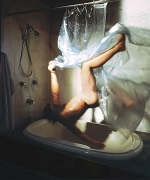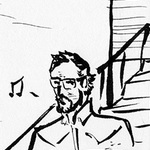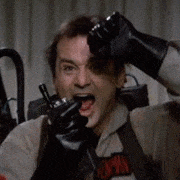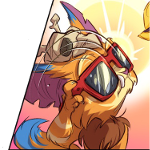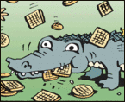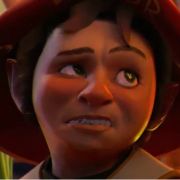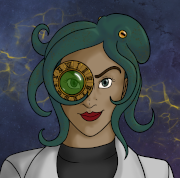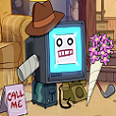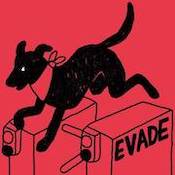|
Stuporstar posted:No, man, this is a craft issue. It's not personal at all. I of course agree that there are exceptions to this rule. I'd be more inclined to agree with you if so many people didn't outright balk at the suggestion to stop putting so much boring poo poo into their stories. But they do. Nearly every time. They sit there and argue that you NEED to know all this dumb crap, even though their own favorite stories don't fall into such traps. That's not a symptom of faulty craft, it's a symptom of boring character. Of having nothing to actually say. Sure, everyone writes a scene or two that upon further reflection doesn't really add to the story or would work better in a different part of the story, but that isn't what I'm talking about. I'm talking about writers who simply refuse to accept that nobody wants to hear about a guy's entire medical history before a story starts. Or the writers who refuse to believe that stories about a college couple breaking up aren't going to tickle most people's fancy. It's possible to write about the most inane subject in a fascinating way, if you simply understand what it is about human nature that compels people. If you lack the kind of understanding that tells you that conflict is the key to good stories, then no amount of cleaning up your passive voice is going to help your writing. You're still boring, no one will care. Even telling a writer who doesn't truly understand people to include conflict usually results only in ham-fisted results where "conflict" is stuffed into the same boring story they wanted to write in the first place. So that's just my experience. It's very possible that I'm overly jaded. But if more writers would respond to "I just didn't care to keep reading, I got bored" feedback in a positive way, then I wouldn't be so annoyed with it. Usually telling someone that what they wrote isn't interesting only results in them whining for 20 minutes about why it IS interesting and giving you all kinds of supplemental information that wasn't on the loving pages themselves as if that really is going to matter to a theoretical reader.
|
|
|
|

|
| # ? Apr 26, 2024 06:53 |
|
Nautatrol Rx posted:
I'd say first off, that people have an uncanny ability to smell bullshit. I wish I could define why that is in better terms, but I really can't. When people are reading your story, and the pages and words themselves begin to melt away and become invisible, then you've done it. You created a real character who can honestly be as terrible as you'd like, and people will believe it- because the character is real, and not an avatar you've strung up and made dance to your terrible song. The character has real emotions, reactions to things that exist in pure relation to the world you created. On the other hand, when you can't ever seem to settle into the fact that you're supposed to be lost in a fictional world, when the words and pages never seem to disappear, you'll never believe it's a real character. And every strange thing that character does is simply a reminder that you're reading some rear end in a top hat's words, not a real character's genuine experiences. I'm not sure if that makes sense but that's the best I can describe it. For a phenomenal example of this principle in action, read The Painted Bird. It has some of the most awful, terrible and heart-wrenching stuff I've ever experienced in a book, but (with a few exceptions) it feels genuine, like you really are experiencing life through this kid's eyes as he wanders from village to village in World War 2 Poland. It's considered a classic piece of fiction even though some of the things described in it can make you want to throw up. And yeah, like I said, there are some exceptions in the story. A few times I did find myself remembering that I was just reading a book because the guy overdoes it a bit, but that's part of why its a great example. You can see what works and what doesn't in the same piece of fiction.
|
|
|
|
Chillmatic posted:I of course agree that there are exceptions to this rule. I'd be more inclined to agree with you if so many people didn't outright balk at the suggestion to stop putting so much boring poo poo into their stories. But they do. Nearly every time. They sit there and argue that you NEED to know all this dumb crap, even though their own favorite stories don't fall into such traps. Which is in itself a symptom of immaturity, that myopic self-absorption that consumes most teenagers (that some people never grow out of). The problem is, those details are important to them and they can't imagine what it looks like to someone who's not them. Of course they respond defensively, because they haven't learned to think of their stories as not them either. What I'm saying, is I agree with you here, but not about getting too personal with them during a crit (that doesn't mean not cussing them out). Those people need a, as they say, "What you did talk, not a what you are talk," because most people grow out of this phase—if they don't, they become number twos.
|
|
|
|
sebmojo posted:It sounds tedious and it sounds like you find it tedious. This is bad. Can you put your guy in a lot more trouble? Really put him through poo poo? Steal his wallet, break his finger, give him dysentery. See if that gives you a more interesting way to deliver the payload of agonised self-interrogation? I agree; I'll definitely have to change a few things, stir the pot a little. I'm afraid of stopping and changing the plot because I have failed to get past 20k words in any of my attempts, and this is getting embarrassing. I've already spent 3 years' worth of free time on this project with nothing to show for it.
|
|
|
|
Thanks for the help, I understand what you guys are saying more clearly now. Good to see I started an interesting side discussion, too. I've got a lot of things to think about now. Not much else I can say right now but I appreciated the interesting points.
|
|
|
|
Stuporstar posted:.Those people need a, as they say, "What you did talk, not a what you are talk," because most people grow out of this phase—if they don't, they become number twos. You're right. I guess I should specify that I don't actually say to people "This is horrible. And you're horrible." Even though I might want to.
|
|
|
|
Speaking of writing boring scenes, how would you go about writing a ... well a "montage" scene? Not necessarily the inspiring kind with  Eye of the Tiger Eye of the Tiger  over it, but the more homely/drab kind you might see in some movies where the scene follows the protagonist through an ordinary evening or something else mundane. over it, but the more homely/drab kind you might see in some movies where the scene follows the protagonist through an ordinary evening or something else mundane. Not something you might want to spend a lot of time on (See: boring), but might be necessary to set the mood or contrast to following scenes. There's certainly some limitations compared to what a motion picture can do with such a scene (sound obviously, harder to do narration at the same time...). I find that it can be a powerful thing done right but well... I don't have the writing experience to quite know how to approach it properly.
|
|
|
|
I know it got lost a bit, but something I did in a graphic novel I wrote and never got around to drawing (oh god it takes so long) was to give the character who spent a large amount of time essentially talking to himself a cat. The cat provided some more varied visuals and made his ruminations seem less insane. If you feel that the isolation is important, you can give him an animal or other objects to interact with rather than people. This might not work at all for the story you're telling, but I thought I should at least bring up the possibility.
|
|
|
|
Pimpmust posted:Speaking of writing boring scenes, how would you go about writing a ... well a "montage" scene? It's poetry, not prose, but "The Love Song of J. Alfred Prufrock" is what I think of when I consider the montage scene written down. I think Eliot makes it work by humanizing the narrator and making them an explicit commentator.
|
|
|
|
Criticism! Don't be Kevin Smith. It's one of the most important things in your development as a writer. Anyone who doesn't listen to it is a fool, and anyone who's afraid of it is even more foolish. A writer is the worst judge of their own work, at least for a while. Once some time has passed you can read over something and think "Holy poo poo...this was bad", but at the start it's all to easy to sit there and love what you've written. Opening your work up to the eyes of others can be daunting, but remember one thing: It isn't personal. If there's flaws in anything I've written then I want to know it and more often than not criticism just reiterates what you should already know. Those 3 pages you've written describing someone's daily routine in far too much detail? It's boring to read, and sometimes you need to hear that. I hated the idea of showing my work to people precisely because I thought criticism was the worst thing in the world. No one wants to be told about the things they're doing wrong. But that eye is important to have. Wouldn't you like to know if your last act doesn't make sense to anyone but you? Of course you would. Of course some criticism is going to be bullshit. If someone responds with "Well I hate zombie stories and this is just another one so therefore it's poo poo" then I don't think they're worth listening to. If someone is questioning a plot point, or the motivation of a character or something that's down there on the page then absolutely consider what they're saying. In closing: Yay criticism.
|
|
|
|
I'm an aspiring writer of fantasy and historical fiction who has a few short stories under his belt, but no novels, and right now I'm frustrated with the whole writing process. One of my problems involves plotting. I can think up settings and characters fairly easily, but not so much plots that could sustain a full novel. When writing short stories, sometimes I can generate a whole plot in my head after winging or pantsing the first scene or moment, but I don't know if this approach could work for longer stories. I do know that I need to have a setting at least partly developed before beginning to write, which brings me to the second problem: research. Researching isn't necessarily hard per se, but the sheer volume I have to do before writing certain stories intimidates me. I worry that by the time I finish researching a certain subject I might lose enthusiasm in my original idea or get distracted by another. Speaking of distractions and losing enthusiasm, that may be my biggest problem. My muse is extremely fickle and short-lived. Often I get all excited about an idea but over time burn out on it, get distracted by another idea, or most commonly realize inherent flaws in the original idea and thus can't continue the story. I am not the kind of guy who can slog on with a story after losing inspiration or realizing its basic flaws. I really want to write novels someday, but I have lost confidence in myself.
|
|
|
|
Jabrosky posted:I'm an aspiring writer of fantasy and historical fiction who has a few short stories under his belt, but no novels, and right now I'm frustrated with the whole writing process. It just sounds like you're still figuring out your own personal process, which is going to unique to everyone. You should stick with it until you produce material that you're satisfied with and/or your beta readers are satisfied with. Everyone has a different method. For example, I figure out how my story is going to start and I make sure I know the ending before I start writing, everything in between is up for grabs as far as I'm concerned. Even then, your tools will also dictate your process to some degree. I use Scrivener and am starting to write in a rather non-linear pattern and rewriting later when I have all the little bits I want, then I just slap on some glue and moulding. If you're using Word or GoogleDocs you might be writing in a linear fashion from start to finish, which has its strengths and weaknesses. But in the end it boils down to what works and what gets the job done, which is going to be different for everyone, you should just keep at it until you find this process for yourself. Jabrosky posted:Researching isn't necessarily hard per se, but the sheer volume I have to do before writing certain stories intimidates me. I worry that by the time I finish researching a certain subject I might lose enthusiasm in my original idea or get distracted by another. My advice is to lie. Writers are professional bullshitters, we're trying to sell the farts and rainbows we come up with in our heads. For historical fiction you should research the BIG PICTURE and then lie your pants off. Focus on the fiction and don't worry about the minute details, throw in just enough to satiate your audience and the nitpickers, there will always be nitpickers. One caveat, be dreadfully specific with your guns, your horses, and your military technology, these are the things people will nitpick the most. Jabrosky posted:Speaking of distractions and losing enthusiasm, that may be my biggest problem. My muse is extremely fickle and short-lived. Often I get all excited about an idea but over time burn out on it, get distracted by another idea, or most commonly realize inherent flaws in the original idea and thus can't continue the story. I am not the kind of guy who can slog on with a story after losing inspiration or realizing its basic flaws. gently caress your muse, you tell that muse to get in the drivers seat and do his or her job. Writers are not at the behest of muses and writers who find themselves chained to some farcical notion that they need to be inspired when they're writing never get anything done because they have to be "in the mood" before getting to it. Your first draft will be poo poo, your second draft will be a little less lovely, you won't be happy with your final draft. If you can get in the mindset that you have to compromise the ability of your your manuscript to work with the vision in your head you'll be off to a good start. Never edit until you've completed the draft, don't think about anything but the story, you want to be writing in pure white hot creative mode, where the words are flying off your fingers like water in a pan full of hot oil. You'll come back next week to edit it and wonder how you're going to be a writer when all you wrote is poo poo but then you'll edit it and make it better. Writing is not the hard part, editing it to the best version of your vision for the project is the hard part.
|
|
|
|
HiddenGecko posted:It just sounds like you're still figuring out your own personal process, which is going to unique to everyone. You should stick with it until you produce material that you're satisfied with and/or your beta readers are satisfied with. Everyone has a different method. For example, I figure out how my story is going to start and I make sure I know the ending before I start writing, everything in between is up for grabs as far as I'm concerned. Even then, your tools will also dictate your process to some degree. I use Scrivener and am starting to write in a rather non-linear pattern and rewriting later when I have all the little bits I want, then I just slap on some glue and moulding. If you're using Word or GoogleDocs you might be writing in a linear fashion from start to finish, which has its strengths and weaknesses. But in the end it boils down to what works and what gets the job done, which is going to be different for everyone, you should just keep at it until you find this process for yourself. I have Scrivener too, but haven't used it in a while (dunno why). In the past I did like its organization system. quote:gently caress your muse, you tell that muse to get in the drivers seat and do his or her job. Writers are not at the behest of muses and writers who find themselves chained to some farcical notion that they need to be inspired when they're writing never get anything done because they have to be "in the mood" before getting to it. Your first draft will be poo poo, your second draft will be a little less lovely, you won't be happy with your final draft. If you can get in the mindset that you have to compromise the ability of your your manuscript to work with the vision in your head you'll be off to a good start. You raise great points. I do need to shut up my inner critic and stop being a perfectionist, as that has never gotten me anywhere. Thanks a lot!
|
|
|
|
I do want to clarify in general though about inspiration. Writing is a magical process where the ideas in your head take flesh in someone else's head, it's fantastic and you should be inspired to some degree, have some passion before jumping into the slog. And you should develop controls for doing this of course, some writers need to hike five miles into the woods with nothing but a notebook and a pencil to create, others just need a stool, a desk, and a pot of coffee somewhere quiet in their house. But once you figure that out, once you know how to mold ideas into plot, plot into story, and you're talking to your fictional characters in your head because they're so real you need to interview them to figure out where to go in the story then you're going to stick in it for the long haul. The process of writing is laborious, long, alone, and the rewards range from nothing to superstardom. But I write because I have to, it's like pent up bile in my brain that has to get out. Ideas ust float in the air until you grab them and make them do what you want in your story, sometimes you'll mash several ideas together because they need to support one another, sometimes an idea will be so pervasive that it can give you 50000 words in less than a week. It all comes with practice and a healthy dose of realism about your abilities and what you need to do to improve them. You just need to keep at it and ignore people who tell you to stop(This is the secret to all writing really, we're all fond of culling, you just need to learn how to duck until we hand you your scythe). Welp, that's my general feel-good post for the day.
|
|
|
|
Jabrosky, enter the Thunderdome next week. You might just find a new muse.
|
|
|
|
Yes, Jabrosky, enter the Thunderdome. There is nothing there but happiness and cool dudes for your muse. You might also get an awesome custom title (and avatar if you're amazing enough!)!
|
|
|
|
Argh, how the hell does one tell one's inner critic to shut the hell up and stop screaming "this poo poo sucks" when I'm trying to write? I cannot stop myself from trying to re-write the opening of my short story a billion times. It's driving me crazy.
|
|
|
|
Stabbey_the_Clown posted:Argh, how the hell does one tell one's inner critic to shut the hell up and stop screaming "this poo poo sucks" when I'm trying to write? I cannot stop myself from trying to re-write the opening of my short story a billion times. It's driving me crazy. Stop sucking. Works pretty good for me.
|
|
|
|
Stabbey_the_Clown posted:Argh, how the hell does one tell one's inner critic to shut the hell up and stop screaming "this poo poo sucks" when I'm trying to write? I cannot stop myself from trying to re-write the opening of my short story a billion times. It's driving me crazy. Write it and move on, fix it when you're editing later. You're probably going to delete your first few paragraphs anyway. It's ok to have a lovely first draft, just make sure the one you show people later on is good.
|
|
|
|
Stabbey_the_Clown posted:Argh, how the hell does one tell one's inner critic to shut the hell up and stop screaming "this poo poo sucks" when I'm trying to write? I cannot stop myself from trying to re-write the opening of my short story a billion times. It's driving me crazy. I typically title all my first drafts "super-lovely first draft that will inevitably be terrible" and then start writing and don't look back. I find acknowledging that it's going to suck balls helps the inner critic go away. What is it going to say when I've already labeled the thing a piece of poo poo? And my first drafts are, in fact, incredibly awful. Lots of telling, lots of telling at really awkward places because I forgot to tell it earlier and just thought of it now, when it ties in to whatever other thing I'm telling about. The thing about first drafts is that they're just for getting your ideas down on paper, and it doesn't matter how much they suck, because you are going to rewrite and fix nearly every goddamned part of it later. But you have to get that poo poo down on paper first so you have something to rewrite and fix. And you have to get the ENTIRE thing down, because that's the only way you can have enough of what happens really figured out to put everything where it needs to be. Like if you haven't written to the end scene where your heroine uses her cut-off grappling hook like a lasso to catch the bad guy, then you don't know that you need to put something in at the beginning mentioning she grew up on a farm and knows how to use a lasso.
|
|
|
|
Stabbey_the_Clown posted:Argh, how the hell does one tell one's inner critic to shut the hell up and stop screaming "this poo poo sucks" when I'm trying to write? I cannot stop myself from trying to re-write the opening of my short story a billion times. It's driving me crazy. It seems like there are a lot of variations on the question of how one goes about not sabotaging themselves with insecurities. What you call your inner critic is your ego wanting to create something beyond criticism on the first try. We all know we're not perfect, but being reminded of it still sucks. The fact is that it doesn't matter whether or not your writing is a pile of poo poo. Literally no one cares. You shouldn't either, you should want to write. How do you feel more confident about your writing? Write. How do you shut up the inner critic so you can get past your opening? Write. In a way the "nobody gives one iota of one poo poo about your writing" approach is the most liberating. Sort of like Dr. Kolctopussy, I tend to title my working files things like "SELF INDULGENT MAGICAL FANTASY CRAP" or "shut up no one cares." It's just words on a screen that will one day be gone like everything else. A novelty. You're a monkey that can use little symbols to make loving magical pictures in another monkey's head, Like HiddenGecko said. Worry about minutiae like quality after you've let the raw material flow onto the page. If you were a visual artist, you wouldn't draw detailed eyeballs before sketching in the rest of the portrait. So don't overwork any one part of your piece just yet. You need it all to be there before you can figure out how the beginning will fit with the rest.
|
|
|
|
Jabrosky posted:I'm an aspiring writer of fantasy and historical fiction who has a few short stories under his belt, but no novels, and right now I'm frustrated with the whole writing process. e: this guy. SurreptitiousMuffin fucked around with this message at 04:10 on Aug 13, 2012 |
|
|
|
HiddenGecko brought up an interesting thought:HiddenGecko posted:...People cut off words, cut each other off.. What is the best way to show this in prose? Would it be like something such as: 'Look, maybe if we give this a cha-' 'No it just wont work' John interrupted. I know that 'Said' is usually a better fallback word but I am wondering how to make it clear that it's an interruption. I feels like character voice would play a large part in helping identify people in this interruption.
|
|
|
|
That should work fine without even using dialogue tags at all. "Dude, remember that one time your mom -" "Shut the gently caress up."
|
|
|
|
Mhm, it feels like as long as you have decent character voices and it's clear who is speaking in that convocation, it should be fine.
|
|
|
|
Martello posted:That should work fine without even using dialogue tags at all. It's "--" unless it is in modern, computer controlled print like in a word processor. It's the difference between potato-rear end in a top hat and potato--rear end in a top hat.
|
|
|
|
Yeah I know it should be an em dash, but it looks stupid when it's -- typed out on here.
|
|
|
|
Nautatrol Rx posted:It's "--" unless it is in modern, computer controlled print like in a word processor. No loving wonder you mentioned getting a shitton of rejection letters. You were spewing potato filled novels on the poor sods.
|
|
|
|
SkySteak posted:No loving wonder you mentioned getting a shitton of rejection letters. You were spewing potato filled novels on the poor sods. The potato is a noble creature, and I would thank you to not be so ignorant. Edit: and also -1 point on the next TD contest you enter that I'm judging for the pun.
|
|
|
|
SkySteak posted:
That's exactly what I do. I edited your example a little bit since in my opinion "interrupted" is redundant with the em-dash(stupid freaking fancy words for things.) there. as long as you're consistent with how people cut each other off. Other examples. "I just wanted to see..." Amy said. "Shut up, we have to activate the reactor." (obviously for trailing off also changes the tone quite a bit with ellipses) "Dan nabit, there's a piece o' silly putty on ma' shoe." (DON'T go overboard with this kind of word cutting, phonetic accents. Readers will get annoyed if they can't understand what your character is saying.) Also don't be afraid to write dialog in fragments, single word sentences, slightly bad phrasing if your character is kind of stupid. etc. Make them talk like they got a pair of lungs.
|
|
|
|
HiddenGecko posted:-Advice- That makes sense. Though, I was under the impression that you should generally stay away from ellipsis? Then again It's usually doing it....like....this that gets warned away from.
|
|
|
|
I want to say it really is awful to not use "--" for that. Convention is "--" because typewriters. The extra character won't kill you, and it makes it clear to everyone, educated and dumb, that you're doing an interrupt. If you have a specific (good) reason to break that convention, do it by all means. I challenge someone, anyone, to come up with a good reason not typing that second character, for clarity, is better than what everyone else finds perfectly fine "--". So there, buttheads. SkySteak posted:stay away from ellipsis Erik Shawn-Bohner fucked around with this message at 04:15 on Aug 14, 2012 |
|
|
|
As with all things art/writing/poetry/etc. If you can make it work then you can use it. Your character has to be kind of a patsy and you have to establish that or else ellipsis won't work. Otherwise just steer clear of them, unless you can make them work well. "No rules, make it work, make it work well" is pretty much my philosophy on such things. Also, per Wikipedia: An ellipsis can be used to indicate an unfinished thought or, at the end of a sentence, a trailing off into silence (aposiopesis), example: "But I thought he was . . ." When placed at the beginning or end of a sentence, the ellipsis can also inspire a feeling of melancholy or longing. The ellipsis calls for a slight pause in speech or any other form of text, but it is incorrect to use ellipses solely to indicate a pause in speech. Just in case I was getting a little too artsy fartsy there. HiddenGecko fucked around with this message at 07:48 on Aug 14, 2012 |
|
|
|
Sometimes I use "---" I have no idea why, the extra dash somehow makes it look more interupt-y to me. SaviourX was nice enough to point this out in a super awesome critique that I forgot to thank them for after the July fiction contest. (If you happen to see this, thank you!) I'm glad to know there is a standard. Question though. Would I use "--" if a character interrupted their own dialog with an action? Like ""blah blah blah--" so-and-so did a thing "--blah blah blahblahblah." Or would a comma work better?
|
|
|
|
My irrationally heated opinions on a lot of things, such as ellipses and the use of dashes v hyphens, is born from seeing it used far, far too much. In the case of ellipses, I see far too many writings that use it in an awful way, such as making every other character end their sentences with "...". Worst case scenarios actually do it mid-paragraph or as if it were a period. Dashes suffer the same fate. A comma is less obtrusive, so it's easier to have interspersed action (something I really like) in dialogue. A dash should be treated like a big ole "HERE'S A SURPRISE" sign. You don't want to make a habit of it. So, I'd say a comma is always best unless you have some sort of really unexpected, outside thing happening. A character picking up a cigarette vs getting a bullet through the head mid-sentence. The dashes should be as sparse as the BIG TWISTs are. Some people manage to do really weird things with grammar without it sucking horribly. Dialogue seems to be the most often place where that happens. My core thoughts are that you should experiment with stuff like that, but don't be surprised when people hate it due to it being confusing or just plain tiresome on the eyes. If you can make it so it's serving a purpose, such as speeding up the pace of a story faster than convention will allow or stressing some word in an absurd way because there's a hidden meaning, then it can be a great technique.
|
|
|
|
Okay so there's a part in a thing I'm writing where a guy reads some poetry and is truly, deeply moved by it. He's writing about it in a diary, speaking to the reader, so I just have him saying (paraphrased) "it was really really really good." I'm trying to think of a better way of getting that across to the reader. Right now it's like I'm beating the reader over the head with "no man it was so awesome you gotta believe me." Telling rather than showing or whatever. Should I insert a bit of the poem into the text? Or whaaaat. Chexoid fucked around with this message at 09:45 on Aug 15, 2012 |
|
|
|
How educated is the character? I don't know if it might seem overly academic, but hurling literary jargon at the reader in a way that makes it clear he really loves the text might do the trick. The average reader might not be very interested in reading through some guy's disjointed literary ramblings on the text, but really that all depends on your target audience. Worst case scenario, the average reader skips over that section and people with formal literary education rock through it. Alternately, you could try doing what the romantics did and describe his experience of the poem. Being 'genuinely affected' by a work is going to lead one to make some pretty flowery statements, but again this might not be appropriate based on the type of reader you're aiming for or the character's personality (I can't see a hardened PI describing poetry in flowery terms even if he describes a writhing cesspit of copulation and debauchery that way). Putting the actual poem into the text would be a dangerous thing to do. You run the risk of writing a poo poo poem and then having the reader go "wow this guy is a loser" when your guy likes it so much. If on the other hand your poem is genuinely great, you might have your readers overempathise with the character if he's not very sympathetic. In my opinion the safest way to go about it if you plan on putting in the actual poem is to write it around the character. It's obvious why and how the character loves the poem so much if it's been written for him. You can ignore this entire paragraph if it's a poem by someone else. EDIT: Personally I'd use a combination of the first two methods to describe the content and how it affected him. If it's overblown then the guy is a bit of a romantic; if it's realistic the guy just really appreciates his poetry. I'd avoid using the actual poem because that could all too easily distract from the main writing if you're not a decent poet. Purple Prince fucked around with this message at 11:50 on Aug 15, 2012 |
|
|
|
Try this: "Really, really, really, ridiculously good."
|
|
|
|
Hello writers! If you could take a moment to read this sticky, I'd very much appreciate it: http://forums.somethingawful.com/showthread.php?threadid=3501699
|
|
|
|

|
| # ? Apr 26, 2024 06:53 |
|
HiddenGecko posted:"Dan nabit, there's a piece o' silly putty on ma' shoe." (DON'T go overboard with this kind of word cutting, phonetic accents. Readers will get annoyed if they can't understand what your character is saying.) This brings up an interesting thing -- eye-dialect. Who loves it, who hates it, who has advice on when and how to use it? I've seen it used very well, a little in Cormac McCarthy's work, and a lot in Brian Azzarello's writing on 100 Bullets. But I've also seen it used badly, mostly in lovely amateur writing. I guess my idea would be to keep it legible above all.
|
|
|





